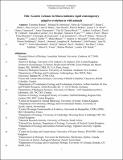Genetic variance in fitness indicates rapid contemporary adaptive evolution in wild animals
Abstract
The rate of adaptive evolution, the contribution of selection to genetic changes that increase mean fitness, is determined by the additive genetic variance in individual relative fitness. To date, there are few robust estimates of this parameter for natural populations, and it is therefore unclear whether adaptive evolution can play a meaningful role in short-term population dynamics. We developed and applied quantitative genetic methods to long-term datasets from 19 wild bird and mammal populations and found that, while estimates vary between populations, additive genetic variance in relative fitness is often substantial and, on average, twice that of previous estimates. We show that these rates of contemporary adaptive evolution can affect population dynamics and hence that natural selection has the potential to partly mitigate effects of current environmental change.
Citation
Bonnet , T , Morrissey , M B , de Villemereuil , P , Alberts , S C , Arcese , P , Bailey , L D , Boutin , S , Brekke , P , Brent , L J N , Camenisch , G , Charmantier , A , Clutton-Brock , T H , Cockburn , A , Coltman , D W , Courtiol , A , Davidian , E , Evans , S R , Ewen , J G , Festa-Bianchet , M , de Franceschi , C , Gustafsson , L , Höner , O P , Houslay , T M , Keller , L F , Manser , M , McAdam , A G , McLean , E , Nietlisbach , P , Osmond , H L , Pemberton , J M , Postma , E , Reid , J M , Rutschmann , A , Santure , A W , Sheldon , B C , Slate , J , Teplitsky , C , Visser , M E , Wachter , B & Kruuk , L E B 2022 , ' Genetic variance in fitness indicates rapid contemporary adaptive evolution in wild animals ' , Science , vol. 376 , no. 6596 , pp. 1012-1016 . https://doi.org/10.1126/science.abk0853
Publication
Science
Status
Peer reviewed
ISSN
0036-8075Type
Journal article
Description
Funding: Hoge Veluwe great tits: the NIOO-KNAW, ERC, and numerous funding agencies; Wytham great tits: Biotechnology and Biological Sciences Research Council, ERC, and the UK Natural Environment Research Council (NERC).Collections
Items in the St Andrews Research Repository are protected by copyright, with all rights reserved, unless otherwise indicated.

